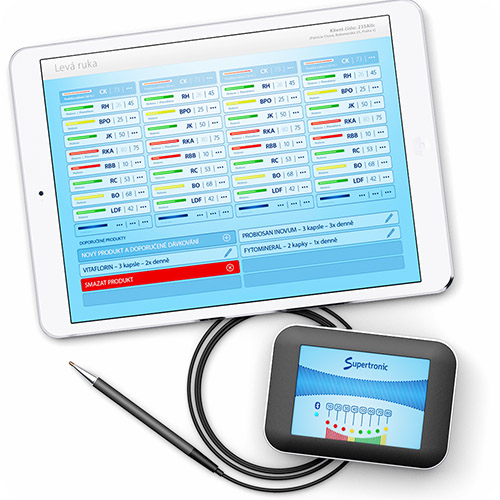
Discover Holistic Healing at Patrick Murphy’s Herbal Clinic
June 13, 2024
Discover the Oxy-Powder Digestive Formula: Your Key to Better Digestive Health
August 29, 2024
By Patrick Murphy, Medical Herbalist
Irritable Bowel Syndrome (IBS) is a common digestive disorder that affects millions of people worldwide. (source) As a medical herbalist, I've encountered numerous individuals seeking relief from this often debilitating condition. In this article, I'll share my insights on (IBS), its triggers, and how herbal remedies can provide much-needed relief.
Understanding Irritable Bowel Syndrome (IBS)
IBS is frequently considered an embarrassing problem due to its symptoms, and there is no definitive scientific cause or cure. (source) However, symptoms can usually be managed effectively. As an herbalist, my role involves identifying these symptoms and understanding their possible underlying causes through in-depth discussions with my clients.
Patrick Murphy's Lower Bowel Formula
Introducing Patrick Murphy's Lower Bowel Formula, a specially crafted herbal blend designed to provide relief for sufferers of Irritable Bowel Syndrome (IBS) and bloating. This formula combines the power of several potent herbs known for their digestive benefits, working synergistically to support healthy bowel function, reduce discomfort, and alleviate the symptoms associated with IBS. By incorporating Patrick Murphy's Lower Bowel Formula into their routine, sufferers can find natural, effective relief and improve their overall digestive health.
Pre-Order Yours Today

Recognizing Irritable Bowel Syndrome (IBS) Symptoms
Irritable Bowel Syndrome (IBS) manifests in a variety of symptoms, the most common of which include:
- Abdominal pain: Cramping or discomfort in the stomach area. (source)
- Diarrhoea and/or constipation: Frequent loose stools or difficulty in bowel movements, often alternating between the two. (source)
- Bloating and swelling of the abdomen: Feeling of fullness or swelling in the stomach area. (source)
- Excessive and blocked wind: Frequent passing of gas or feeling of trapped wind. (source)
- Increased gastro-colic reflux: Stronger urge to have a bowel movement after eating. (source)
- Sensation of incomplete bowel movements: Feeling that bowel movements are not fully completed. (source)
- Passing mucus: Presence of mucus in the stool. (source)
Additional symptoms to be aware of include:
- Headaches: Frequent or persistent headaches.
- Nausea: Feeling of sickness or urge to vomit.
- Vomiting: Expelling stomach contents through the mouth.
- Food sensitivities: Adverse reactions to certain foods.
- Weight loss: Unintentional loss of body weight.
- Dizziness: Feeling lightheaded or unsteady.
- Fibromyalgia (feeling tender): Widespread muscle pain and tenderness.
- Backache: Pain in the lower back region.
- Frequent urination: Need to urinate more often than usual.
- Fatigue: Persistent feeling of tiredness or exhaustion.
- Anxiety: Feelings of worry, nervousness, or unease.
- Depression: Persistent feelings of sadness and loss of interest.
- Belching: Expelling gas from the stomach through the mouth.
- Feeling quickly full after eating: Becoming satiated after eating small amounts.
Causes of Irritable Bowel Syndrome (IBS)
IBS is primarily caused by abnormal contractions in the bowel. These contractions, which are normally regular, become more frequent in Irritable Bowel Syndrome IBS sufferers. Possible triggers include food sensitivities, stress, lifestyle choices, and diet. Bacterial or viral infections can also initiate IBS.
Ensuring clients receive the right nutrients is crucial for proper intestinal function. Two key nutrients are L-Glutamine and N-acetyl glucosamine, amino acids that become depleted during times of stress. Supplementation can help if symptoms are stress-related.

Herbal Remedies for Irritable Bowel Syndrome (IBS)
Every client is unique, and therefore, no single herbal remedy works for all. Here are some of the most effective herbs I've used in treating Irritable Bowel Syndrome (IBS):
- Peppermint (Mentha Piperita): Calms the colon muscles, useful for diarrhoea and abdominal discomfort. Note: can exacerbate heartburn in some clients.
- Meadowsweet (Filipendula ulmaria): Relieves indigestion, gas, and reflux with its anti-inflammatory and antacid properties.
- Chamomile Flowers (Matricaria recutita): Helps with bloating, gas, and abdominal cramps, particularly when symptoms are stress-related.
- Slippery Elm Bark Powder (Ulmus Fulva): Reduces digestive tract irritation, protects mucous membranes, and eases cramping and wind.
- Fenugreek (Trigonella foenum-graecum): Excellent for dispelling excess gas and dissolving mucus.
- Marshmallow Root (Althea officinalis): Supports the gastrointestinal tract by producing mucilage, providing relief to inflamed bowels.
- Yerba Mansa (Anemopsis californica): Anti-inflammatory, astringent, and anti-bacterial, it helps reduce mucous production and stop diarrhoea.
Other Ways to Help Irritable Bowel Syndrome (IBS) Sufferers
Stress, poor diet, and food allergies can be common Irritable Bowel Syndrome (IBS) triggers. Ensuring clients consume adequate amounts of the right type of fibre is vital. Soluble fibre, found in foods like broccoli, brussels sprouts, beans, oats, and some fruit skins, turns into a gel in the gut. Insoluble fibre, found in high-fibre cereals, celery, and green beans, acts as a bulking agent.
Psyllium seed husk powder is a soluble bulking fibre that supports the gut. I recommend one teaspoon, three times a day, soaked before use to prevent issues. It may initially cause flatulence, but this should subside.
Additional recommendations include:
- Avoid stimulants such as caffeine, tea, and sodas.
- Eating slowly, chewing food thoroughly, and eating in a relaxed atmosphere.
- Adding fresh fruit and vegetable juices to their diet.
- Learning to cope with stress, as chronic stress can hinder peristalsis.
- Taking probiotics containing Lactobacilli to help with digestive flora, especially after food poisoning or digestive infections.
Reviewing Your Client's Progress
Regularly reviewing your client's progress is essential. Note any positive aspects of the treatments and alter the treatment if they suffer any negative effects. If the client has blood in their stools, it's important they see a medical practitioner for potential tests or diagnosis before continuing herbal treatment.
By following these guidelines, you can help your clients manage their Irritable Bowel Syndrome (IBS) symptoms effectively and improve their overall quality of life. As a medical herbalist, my goal is to provide holistic, natural relief to those suffering from Irritable Bowel Syndrome (IBS), ensuring they lead healthier, more comfortable lives.



















